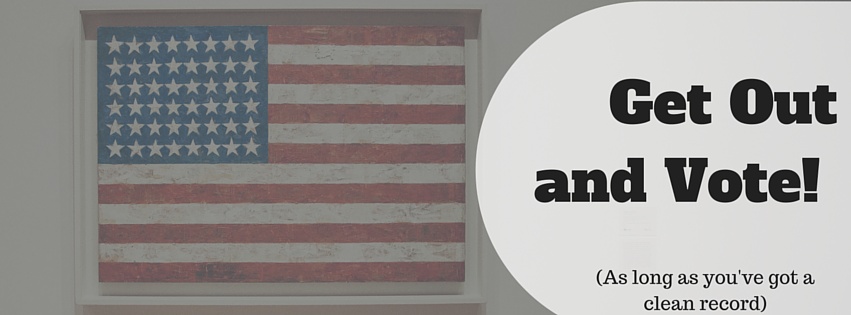
The backbone of America–and American democracy, more specifically–is the empowerment of voters. When people get out and vote, their voices are heard, their choices are reflected, and the more popular candidate is elected (typically). Giving the people in the nation the ability to elect their own leader is the essence of a government for the people, by the people.
There are, of course, restrictions. To be eligible to vote in the United States of America, you need to be at least 18 years of age on or before election day. You must also be a United States citizen, and a legal resident of the state in which you’re casting your presidential ballot.
And, if you’re a resident of any state other than Vermont and Maryland, you must have a clean rap sheet. That means that, if you’ve been convicted of a felony in 48 of the 50 states, you’re at risk of losing your eligibility to chose the leader of the nation you call home. Essentially, your political voice is taken away, locked behind the same bars that you’ve been confined to for your apparent misdeeds.
The details regarding how long the ban on voting lasts differ state to state. For example, 14 states, plus Washington DC allow for felons to vote once they have served their time and have been released. Four states, California, Colorado, Connecticut, and New York, restore voting rights after release, plus any period of parole the former inmate may have been assigned. Twenty others–the most common form of the law prohibiting felons from voting–restrict access during probation, prison and parole periods.
Perhaps most interestingly are the 10 states that allow for the possibility of a permanent ban from voting. These are sometimes used in cases of violent or repeat-offenders. Other times, as is the case in Kentucky, for example, a convicted felon loses his right to vote permanently, but can, upon his release, appeal to the governor for reinstatement. In Florida, there is a mandatory five year waiting period before application to regain voting rights.
These laws have raised a few questions, particularly among legal scholars. Advocates for the legal ban of felons from voting claim it’s simple reasoning: if they don’t have the judgement ability to follow the law, they don’t have the judgement ability to vote.
Roger Clegg, president of the conservative advocacy group Center for Equal Opportunity, was quoted by TIME as having claimed “If you aren’t willing to follow the law, you can’t claim the right to make the law for everyone else.”
While some question the Constitutionality of banning felons (even ones who committed the act in the distant past) the Supreme Court ruling in Richardson v. Ramirez should put that to rest. The ruling allowed for the disenfranchisement of voter rights in the case of felonies, ultimately leaving it up to the states to individually determine their own laws on the matter. And, as I mentioned above, they have done just that.
So in a nation in which we’re encouraged by slogans like Rock the Vote, Your Voice Your Vote and even Vote or Die, roughly 5.3 million Americans will be denied that privilege come this November.
